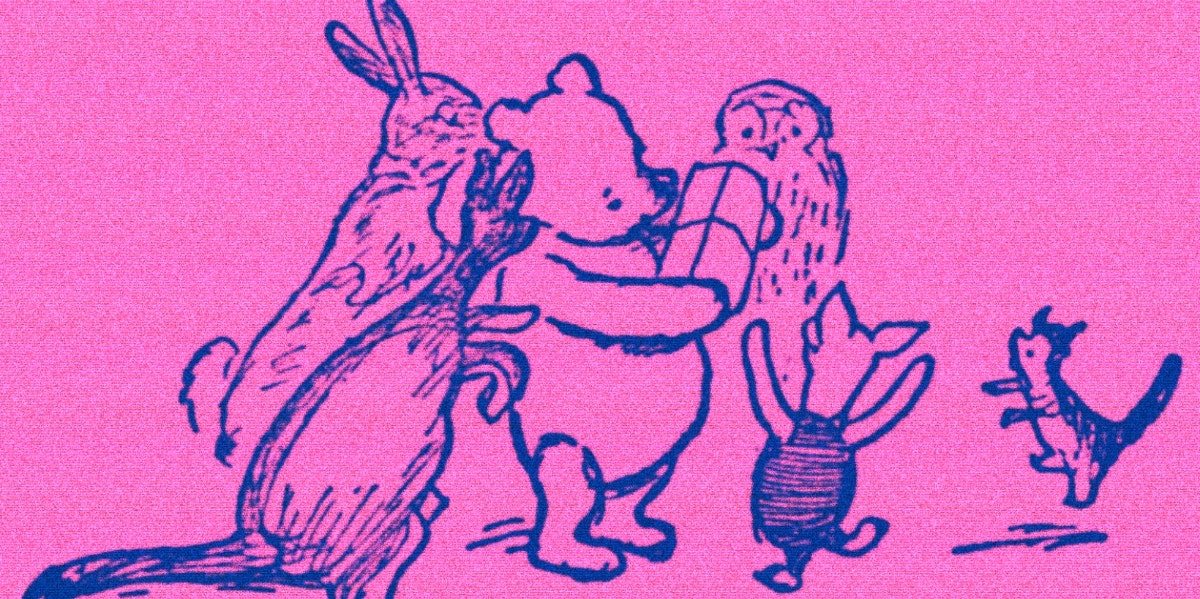This Test Identifies Your 'Psychiatric Diagnosis' Based On Winnie-The-Pooh Characters
A theory explores how each “Winnie the Pooh” character correlates to a specific mental disorder.
 Ernest Howard Shepard / Wikimedia Commons
Ernest Howard Shepard / Wikimedia Commons “Winnie-the-Pooh” is known for teaching life lessons on things like friendship, kindness, and gratitude. Like with many children’s books and movies, however, when you read into them, you can often find that they go a little deeper than what they appear to be about on the surface. For example, there’s a theory that each “Winnie-the-Pooh” character correlates to a specific mental disorder.
Dr. Sarah E. Shea, Dr. Kevin Gordon, and their associates analyzed “Winnie the Pooh” characters and published their findings in a study titled “Pathology in the Hundred Acre Wood: a neurodevelopmental perspective on A.A. Milne.”
“On the surface it is an innocent world, but on closer examination by our group of experts we find a forest where neurodevelopmental and psychosocial problems go unrecognized and untreated,” they explain in the study.
They found that each of the characters met criteria for "significant" mental health conditions listed in the Diagnostic and Statistical Manual of Mental Disorders, more commonly referred to as the DSM. Based on their finding, the Pooh Pathology Test was created as a fun way to determine which Winnie-the-Pooh character and related diagnoses are most like you and your own behaviors.
How to Take the Pooh Pathology Test
IDRLabs created a 33-question test based on the work of Drs. Shea and Gordon. The Pooh Pathology Test asks you to rate yourself on specific behaviors that are easier to identify in yourself than it would be to identify the exact traits each corresponds to.
Your results are then presented to you in a simple graph that portrays how you were rated on each trait, with a percentage noted for how similar you are to each “Winnie-the-Pooh” character and the mental health disorders they illustrate.
While free online personality quizzes are fun to take, it’s important to note that they are in no way an actual diagnosis of any mental illness and are instead meant only for entertainment purposes.
IDRLabs explains that while the "Winnie-the-Pooh" personality test is meant to be “as reliable, valid, accurate, and complete as possible,” further clarifying that it “should not be construed as providing professional or certified advice of any kind.”
Once you’ve identified the character most similar to you, you can look into the characteristics and traits that character embodies to see if they sound familiar to you.
Here is each “Winnie-the-Pooh” character and their supposed mental condition.
1. Winnie-the-Pooh: Attention Deficit Hyperactivity Disorder (ADHD), Inattentive Type
According to the researchers, Pooh actually demonstrates comorbidity, or the presence and interaction of two or more disorders. They found that along with ADHD, Pooh likely also deals with cognitive impairment and Obsessive-Compulsive Disorder (OCD).
Inattentive ADHD is characterized by difficulty paying attention to detail, distractibility, and difficulty organizing, prioritizing, and finishing tasks, all traits that Pooh exhibits.
Researchers also point to Pooh’s obsession with honey and his repetitive counting as an example of his OCD.
Finally, Pooh is often described as having a “very little brain” throughout the stories, suggesting cognitive impairment.
2. Piglet: Generalized Anxiety Disorder
Piglet is constantly flustered and high-strung, leading researchers to believe that he suffers from severe anxiety. This diagnosis is based on Piglet’s propensity to jump at any sound and explains his nervousness around Tigger.
3. Eeyore: Depression
Eeyore’s perpetual sadness is clear. Researchers diagnosed the donkey with chronic dysthymia, a long-term form of depression typically characterized by a loss of interest in normal activities, hopelessness, lack of productivity, and low self-esteem.
Eeyore’s depressive tendencies are showcased by his self-deprecating quotes and tendency to look for the bad in everything.
4. Roo: Autism
The Pooh Pathology Test identifies Roo's characteristics as being associated with autism, pointing to his penchant to either sit silently in his overprotective mother’s pouch or, on the other end of the spectrum, find himself in danger due to a lack of attention to his surroundings.
However, researchers didn’t name autism as an issue. They instead noted that these behaviors may emerge as delinquency in adolescence, especially given that Tigger is one of his biggest influences.
5. Tigger: ADHD, Hyperactive-Impulsive Type
Like Pooh, Tigger also exhibits traits correlated with ADHD. However, Tigger is a prime example of ADHD, Hyperactive-Impulsive Type, which has symptoms that differ from that of the inattentive type.
These symptoms include restlessness, excessive talking, and impulsiveness in speech and actions — behaviors that describe just about all of Tigger’s interactions.
6. Rabbit: OCD
According to the Pooh Pathology Test, Rabbit’s personality is similar to that of someone with OCD, displayed by his need to constantly keep everything in an extremely particular order.
Researchers, however, don’t outright name OCD as Rabbit’s issue, instead focusing on his sense of self-importance, need to be in charge, and inflated idea that everyone is his friend, perhaps also pointing to some level of Narcissistic Personality Disorder.
7. Christopher Robin: Schizophrenia
While researchers don’t diagnose Christopher Robin as schizophrenic in their paper, they do suggest that symptoms such as spending all of his time talking to animals that don’t exist is a burgeoning issue.
Micki Spollen is an editor, writer, and traveler. Follow her on Instagram and keep up with her travels on her website.

